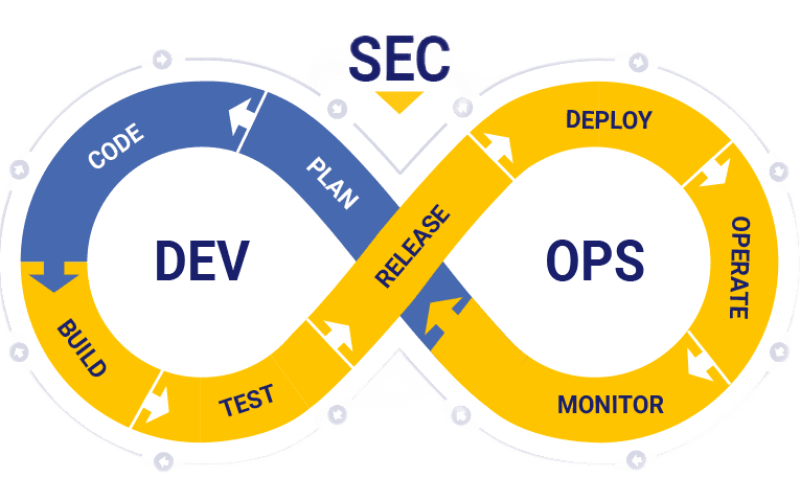Cloud computing has been one of the most valuable technologies of this age. It gives organizations the ability to centralize resources, access assets remotely, scale easily, and enhance overall performance. For software development on the cloud, DevOps is the ideal way to approach it. It allows instantaneous deployment by bringing developers and IT operators on the same page. Cloud DevOps enables organizations to build quality products and accelerate their time to market. However, the growing adoption of cloud technology has also made it a primary target for cyberattacks.
The vulnerability of applications built using the Cloud DevOps combination is due to the oversight of security. It is often the last checkbox that teams tick in the software development lifecycle (SDLC). Therefore, it is important for organizations to prioritize security when developing applications using Cloud DevOps. This led to the emergence of DevSecOps.
Let’s explore how DevSecOps helps organizations address cloud security challenges.
Role of DevSecOps in Cloud Security

DevSecOps is an upgrade from the cloud DevOps approach where security is placed as one of the key priorities while building a product. It essentially brings three important aspects of a reliable software product – Development, Security, and Operations (DevSecOps).
In DevSecOps, security practices are incorporated at every phase of the software development life cycle. It allows organizations to proactively tackle some of the critical security challenges prevalent in cloud environments.
Traditionally in the cloud DevOps method, security was considered in the later stages of the development. The consequences of this approach came to the fore in the wake of an increasing number of cybersecurity attacks. Also, even if teams did find any vulnerabilities before production, it would force the development to go back to its origins, thereby pushing the time-to-release schedule. To avoid these challenges, DevSecOps is now becoming a default approach to building modern applications.
Some of the ways that DevSecOps addresses challenges with cloud security:
1. Creates a culture of transparent collaboration
DevSecOps facilitates open collaboration between the three core teams of software development and ensures that they are all engaged together from the designing phase till the production. Such an approach will make your application resilient to any security risks like misconfiguration.
2. Generates actionable insights in a single place
With everyone engaged in a loop of communication, it facilitates data to be gathered at one single location from multiple sources. This enables teams to quickly spin up insights and reports that can produce actionable insights to make rapid enhancements to the product.
3. Saves time and cost while improving security
Trying to deal with a security issue after happenstance is a resource-intensive endeavor. It will also open up companies to penalties for non-compliance in addition to reputation damage. DevSecOps allows organizations to prevent threats even before they happen by hardening security across development phases. As opposed to cloud DevOps, this security-centric approach helps you protect your application and internal IT ecosystem from vulnerabilities.
4. Automates compliance and enhances testing
With DevSecOps, testing won’t just be a step in the application development process. Instead, you can automate the implementation of compliance along with other security checks. You can also run testing processes like SAST (Static Application Security Testing), DAST (Dynamic Application Security Testing), and IAST (Interactive Application Security Testing) automatically.
5. Advantages of DevSecOps
DevSecOps allows companies to implement practices like automation that will enable scalable and secure application development faster. Some of the key benefits of DevSecOps over cloud DevOps are listed below:
- It enables automated application monitoring and sets off a rollback if and when bugs or risks are detected.
- You can eliminate repetitive and remedial tasks through automation allowing you to focus on core security functions.
- It establishes uniformity across SDLC through consistent security policies.
- By picking AI-powered DevSecOps frameworks, you can conduct advanced threat analysis like suggestions to modify code and proactive identification of vulnerabilities.
Conclusion
Cloud DevOps is a powerful software development process. It revolutionized the speed at which applications can be shipped and streamlined quality practices like scalability and availability. But in terms of security, it fell short. This is mainly due to the increasing number of attacks on cloud environments. It necessitated the emergence of DevSecOps with security as the central philosophy of software development.
To help organizations better track their application performance, Prismberry launched an innovative solution, Cloud DataVision. It allows comprehensive monitoring of your applications, gathers logs, and generates real-time reports through an intuitive dashboard.



